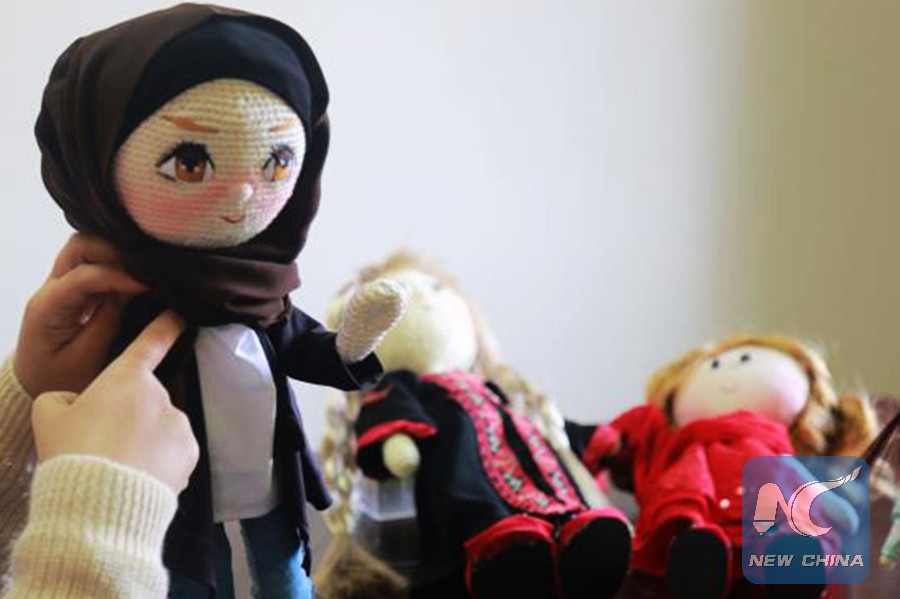
In the southern Gaza Strip town of Rafah, 24-year-old Rewaa Hijazi runs the single dolls making business in the Palestinian enclave, bringing joy to children who dream of owning a doll to their liking. (Xinhua/Saud Abu Ramadan)
GAZA, March 8 (Xinhua) -- In a modest room in her home in the southern Gaza Strip town of Rafah, 24-year-old Rewaa Hijazi runs the single dolls making business in the Palestinian enclave, bringing joy to children who dream of owning a doll to their liking.
Differing from any other dolls making business, Hijazi, a graduate from the School of Arts in Gaza al-Aqsa University, paints the face of every doll she makes according to the buyer's orde.
Some children may want their own face painted on the doll, while others prefer the face of their favorite cartoon figures or a friend - if it is a gift - to be pained on it.
"I began to learn sewing when I was 12 years old and learned how to make and sew wool skirts and children's dresses," Hijazi told Xinhua in an interview.
"My first experience was when I made myself a doll, and it didn't work with me correctly, but over time, I learned more how to master the skill of making dolls," she said.
Hijazi started her own business one year ago in a project called "Sukar (or sugar), Handmade" for making dolls.
When a customer asks Hijazi to make a doll, he or she can bring a photo of self or a character that they like.
Then she would start making the body of the doll, including the arms and legs, filling them with cotton and fibres. In the end, she paints the face of the child or the character on the doll's face.
In the beginning, it was hard for Hijazi to buy the raw materials for making the dolls. She even had to borrow money from her friends to start her business.
Luckily enough, she managed to sell some dolls and earned enough to pay back the debt. A doll with a picture painted on its face is sold for 25 shekels (7 U.S. dollars), from which Hijazi makes a profit of 10 shekels.
Thanks to the social media, Hijazi even managed to sell a doll online for the first time last week to one customer in the West Bank who wanted to give the doll as a gift to her child.
In Gaza, there are around 10 universities and colleges, which every year produce some 22,000 graduates majoring in various field. But unfortunately, most of them face a tough challenge of finding a job as the unemployment rate there has climbed to above 50 percent.
The coastal enclave, which has been under an Israeli blockade since 2007 when it was taken over by the Islamic Hamas movement.
"In Gaza, there are no industry or factories for making toys and dolls for children," Ali al-Hayek, chairman of Gaza Industry Federation, told Xinhua.
"Due to an Israeli blockade and also an internal Palestinian division that have been going on for 11 years, hundreds of factories have closed down as the economy has deteriorated," Hayek said.
The blockade has resulted in a severe shortage of electricity, fuel, water, and medical services.
Palestinian women face an even tougher challenge in finding a job, though they represent 49 percent of the population in Gaza, West Bank and east Jerusalem.
Hijazi said that even she suffers from the shortage of electricity while making dolls, as she cannot work in darkness and operate her small electric sewing machine without the power.
Despite the challenges, Hijazi harbors a dream to expand her business in future, hoping to export her dolls to Arab countries and the rest of the world. She also wishes she could travel abroad and attend Arab and international dolls exhibitions.
"I really dream of having my own business with a huge dolls-making factory in Gaza and exporting my products to all over the world," she said.
Last year, Hijazi participated in a special exhibition at the Center for Women's Affairs in Gaza to display her works which received high praise.
She also participated in a project called "Reyadat," or young pioneers, to show her distinctive project, which won an award along with 15 projects.

